Produced by Element Pictures (Normal People, The Favourite, Poor Things), a Fremantle company, and directed by Janicza Bravo (Zola, Poker Face, Mrs America) for �鶹�� One and �鶹�� iPlayer, The Listeners centres around Claire (Rebecca Hall), a popular English teacher, who begins to hear a low humming sound that no one else around her can hear.
This seemingly innocuous noise gradually upsets the balance of her life, increasing tension between herself and her husband, Paul (Prasanna Puwanarajah), and daughter, Ashley (Mia Tharia). But despite multiple doctors, no obvious source or medical cause can be found. When she discovers that a student of hers, Kyle (Ollie West), can also hear the sound, the two strike up an unlikely and intimate friendship. Finding themselves increasingly isolated from their families, friends and colleagues, they fall in with a disparate group of neighbours, led by a charismatic couple, Jo (Gayle Rankin) and Omar (Amr Waked), who also claim they can hear what they call “The Hum” – but rather than track down the source to stop it, believe it is a gift, heard only by a “chosen few.”
Enigmatic, provocative, and haunting, The Listeners explores the seduction of the wild and unknowable, the human search for the transcendent, the rise of conspiracy culture in the West, and the desire for community and connection in our increasingly polarised times.
- Watch The Listeners on �鶹�� iPlayer on Tuesday 19 November from 6am and on �鶹�� One from 9pm that night.
TheListeners@premiercomms.com
Watch the trailer for The Listeners
Meet the Cast
Rebecca Hall (Claire Kutty)
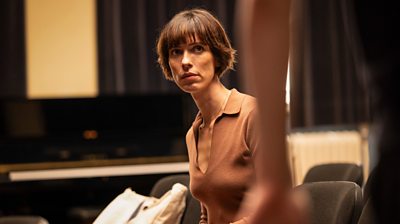
What drew you to The Listeners?
Before even reading the scripts, I was keen to join The Listeners. It was such an odd premise where there are so many possibilities, and that was a draw for me. I’m also a very big fan of director, Janicza’s work and knew her a little bit. So, the combination of those two things was an immediate no brainer for me before reading the scripts.
What were your initial thoughts when you read the scripts?
What I really enjoyed about the scripts is that it explores a mystery that is located in someone's subjective experience. To the rest of the world if there is no way to prove an experience a person is claiming to go through the conclusion is to brand them as crazy. For Claire, a subjective experience is happening, and she is desperately hunting for answers. This throws up the question of how do you prove something that is subjective or that is felt. Leading to a larger metaphor about believing someone. The story ends up taking you down this journey of what can you believe through Claire, where you are thrown into two possibilities, and no actual way to prove either one.
It was very interesting to think about how people treat women's experiences or how people listen to a woman when she says she is going through something difficult and ultimately in pain. How it’s met with disbelief, minimised or shifted in some way, that's explored a lot in The Listeners.
What can you tell us about Claire?
The series is Claire’s story and that is quite rare to come across. Where a series spends a substantial length of time focused on one person's perspective. Fundamentally, Claire is quite normal, there's nothing particularly extraordinary about her. She's charismatic and outspoken. She's the kind of person that was fun to be around in her younger days. Maybe a bit punk, a little bit of a wild card. But where we meet her in the series, she is living a normal, fulfilled existence. She has a child who's about to leave home and she is married. She’s a teacher at a high school teaching literature. She's smart and savvy. She's a modern everywoman!
Tell us about the relationship between Claire, Paul and Ashley?
Claire's household is a very functional, loving and happy family unit. She appears to have a good relationship with her husband, and they had their daughter quite young. So now they are both very settled.
But then this seemingly quite banal thing of Claire hearing an annoying sound starts to cause things around Claire to unravel. All these elements; her relationship with her daughter, husband, her home and her family, we quietly see everything getting dismantled.
Describe what it’s like for Claire when she first starts to hear The Hum?
Claire is the only person who apparently can hear it. Until she finds other people, who, also claim to possibly hear it. But this leaves the question of how this can be proven. It’s like colour, everyone experiences it differently. If a member of a family starts to experience something that everyone else in the family doesn’t, it becomes alienating and pernicious. Slowly The Hum becomes more and more dangerous and wreaks havoc.
Tell us about Claire’s relationship with Kyle.
Claire is under the belief for a long time that she is the only person who can hear The Hum. She goes through all the medical tests to find out if there's something wrong with her physically or mentally and ascertains that there isn’t. Leaving her in nowhere land and she starts to believe that she is going crazy. So, when she comes across Kyle who is having the same experience there is an immediate sense of connection between them. For Claire there is a sense of relief, parity that what she is going through is real. However, Kyle is one of her students, which raises a lot of complications.
What can you tell us about the themes explored of common connection and community?
This story does look at human vulnerabilities and what makes you susceptible to people who might be emotionally manipulative. But it also speaks to a desperation that forces people to become emotionally manipulative because they are equally vulnerable and want to feel connection with other people.
The show to me isn’t about ‘cults’, it’s much more interesting than that. As it’s more about the people who are susceptible to them. Often, it's the people you least expect. It's the people who are smart and have their head screwed on. The Listeners speaks to the fact that we're all vulnerable and at times, desperate and susceptible to all kinds of things to make us feel safer and less alone.
How did you find working with the cast?
I have admired Prasanna from afar for a while, he's an incredible actor and I knew of his work as a theatre director. I was thrilled to get to work with him, he's just a dream. He is so present and thoughtful and articulate about the way he works. It's a very nice environment to be in.
I was also excited to work with actors who are just starting out. Mia for example is very new to this but also has such a wisdom and sense of purpose as an actor. She is incredibly talented and so instinctive, and I really have loved working with her. With Ollie, there is this natural instinctive quality, a sort of gut response that comes to actors who haven't yet been doing it long enough to work out what their safe places are. It's so immediate you really feel like you're being listened to, and you can respond and play and that's exciting. I felt that very strongly with Ollie. He has a very translucent quality about him, which is very powerful and he's great to work with.
What was it like to work with Director, Janicza Bravo?
It was everything I expected and more. I have an unbounded respect for Janicza, she is a true talent, and she has such vision and such detail. She’s determined to get it exactly right, and there is no other way. There is so little compromise, and I love that. It's interesting to work with a director where I've had such a feeling of simpatico, a sense that we've got each other’s backs on this. She's one of those directors that I'll do anything she asks for.
What do you hope audiences will take away from The Listeners?
The Listeners is very philosophically engaging and challenging. It's entertaining and I hope that the audience go on the journey that Claire goes on and into a land of extreme beliefs that you wouldn't have expected someone to believe at the beginning.
Prasanna Puwanarajah (Paul Kutty)
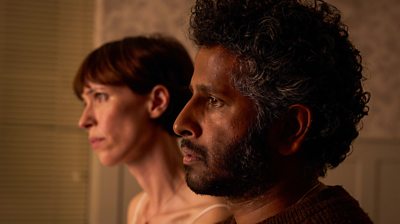
What drew you to The Listeners?
For me it always starts with the script and the story. Who the person is, and what their struggles and obstacles are in life. It’s important for me to see a way into that, and does it feel like it chimes with things that I recognise now or things I feel I might recognise in the future. The scripts were amazing, and the writing is wonderful. It was an exciting combination of character, script, and creative collaborators.
Tell us a bit about Paul and his journey throughout the series?
Paul is a suburban family person. He and Claire got married relatively young in modern speak, and they're at the stage of a relationship where their daughter, Ashley, is soon to be moving out into the world and they've got to work out what the next phase of their relationship is. Paul works in construction and a facet of that is something to do with surveying. I've found it quite useful with this job to not find specifics. In the past, I've tried to charter the journey, but there's something about the world of this series which is poised in this weird orbit and feels slightly apart from reality. It has been quite good to just almost cut all the strings, play the moments and let those things just be questions, responding to human emotional logic rather than the practical real world.
What was interesting to me about this character is how Paul goes through discovery of how far away two people can be, and how frightening, isolating, and dangerous that is to a relationship, which is quite a lot to go through in about forty to fifty days, twenty years into a relationship. It’s kind of like a cold immersion.
What were your initial thoughts when you read the scripts, had you read the book?
I'd come across Jordan's work as a playwright and loved it. I made the decision to read the first few chapters of the book and decided not to finish it or research where the story goes, because the show was sort of being shot sequentially.
When I read the final episode, it was all new information to me. I try to not get too involved with what's happening with other characters on their journeys because I feel it's important to just know the bits that your character knows to avoid telling bits of the story in your performance that your character wouldn’t have access to. This feels like a much closer representation of living life where you're guessing, and people are living whole universes of lives that you just have no sense of. I've found in recent times that it's easier to not play the ending if you don't know the ending.
How is the family unit affected by The Hum?
They're practical and puzzled at first. Then, there's a sense of wanting to believe Claire, but it becomes increasingly hard for it to not be about other things. In a way, The Hum is a kind of MacGuffin at the heart of this, which questions how people in family units find external things in life that intrigue them and further explore them. The fundamental challenge of parenthood is the reality that a child is always going to find their own world. And so they hold on to this practical thing, a sound. The characters don't know what it is, but they have a sense that they will find out and it becomes about a need rather than a sound. I think it may be that they know that this thing is happening to her, but they don't know why or what it is.
What are Paul’s thoughts on the group who hear The Hum?
He meets them and finds them quite bewildering, and he can't work out why Claire would want to disconnect from her family. Because he doesn't understand or have an emotionally empathetic grip on what The Hum is doing as an isolating force and a thing that's pushing them all together. He can't get why she wants to move into this phase of life with these strangers. I think it's a huge puzzle for him. In a way, you can get your head around an affair but this is really strange.
How would Paul have reacted to hearing The Hum?
I think he would have been very practical about seeking out the source, bought sound metres and done full decibel studies to map out the whole thing. He would have absolutely resisted the possibility that it was in some way either self-generated, or psychologically mediated or something that was unmeasurable. I think he would have resisted it a lot longer than Claire.
What do you think the viewers are going to get from watching the show?
I hope the audience will be entertained and gripped by it, and fundamentally I hope they'll see real people in what feels close to a real environment, enough for them to feel like it's a sort of a Narnia portal from their own worlds. The thing that I hope will make this show gripping, interesting and thrilling is its proximity to reality without quite feeling like it's real.
Mia Tharia (Ashley Kutty)
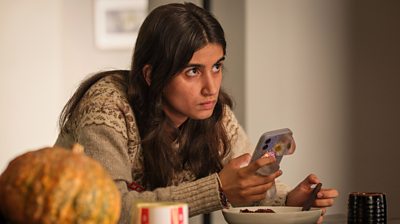
What were your initial thoughts when you read the scripts?
I loved Ashley. The scripts felt very real, which is a simple thing, and I haven't ever read a story or a script where I felt like I really understood it.
I also loved the book. That was another reason why I was really drawn to it. Jordan Tannahill, the author, who was on set a lot of the time is amazing, and with him around it was great because you felt like you had the book in the script. I got the role just before my birthday and then I got the book for my birthday, which was nice.
What can you tell us about the character Ashley?
Ashley is a very different role to anything I've done before. I did a children's show before this where I played a nerdier character, so to have someone who’s got a bit of an edge was a new challenge.
Ashley loves football and she’s a very normal teenage girl. Once things start going on with her mum, Ashley doesn't often make the right decisions. I think she's someone who is trying to keep it all together and keep a kind of ‘I don't care’ attitude, but there's something a bit more scared underneath.
How did you prepare for the role?
One of things I did at first was create a playlist as music is a really great way for me to get into character. It’s quite instinctual and it helps me get into the right headspace. There was a lot of Girl in Red, Florence and the Machine, Mitski, Arctic Monkeys, that kind of stuff.
How does Ashley’s relationship with her mum change once she begins to hear The Hum?
Her mum becomes distant as there is something else in her life that is pulling her away from her family and, for Ashley, that's a threat. Ashley feels like she understands her mum completely and can work out what she's thinking. There's a brilliant line in the book about how they are almost mind-reading each other, and they can understand each other. So when The Hum arrives - something Ashley doesn’t understand or get - it's scary for Ashley because, suddenly, there's something about her mum that she can't understand.
Ashley pulls away from her mum because she's angry and she doesn't understand what’s going on, and her instinct is to become defensive - taking this attitude of “if you're not going to engage with me or be a part of my life, then I'm going to go away too.”
What are Ashley’s views on The Hum group that her mum joins?
To her, they're this group of strange people who are taking her mum away from her, talking about things that, to her, don't make sense or exist. She views them as a ‘cult’ and she doesn’t understand them or like them. Ashley isn’t dependent in the sense that she needs her mum to be around all the time, but she needs that connection and the idea that there’s another group that her mum has a connection with is troubling.
What do you think viewers are going to take away from watching The Listeners?
I think it's going to make viewers feel a little uneasy, in a good way. People will really respond to that. I think the series depicts our deepest, darkest desires in a way that's quite scary, but also exciting.
Ollie West (Kyle Francis)
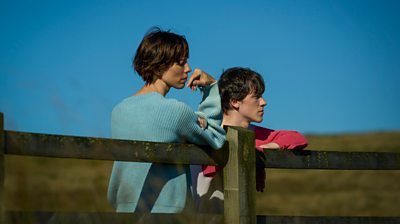
What did you think when you first read the scripts?
I first read the book when I found out that I got the part, it was really good, and then I read the scripts after that which were very cool. The book was one of the most enjoyable reads I’ve ever had.
What can you tell us about Kyle, and where do we find him at the start of the story?
At the start of the series Kyle’s a bit of an average Joe. A lot of people my age struggle with mental health issues and suffer from depression, and Kyle is one of them. He’s very smart and quick witted. He likes books and he’s very good in class, but he probably thinks school is a bit of a waste of time.
How did you prepare for the role?
There were simple things. I would have a little notebook and draw things I think Kyle would draw, write things I think he’d write and try to find music that I thought Kyle would be into. Every time I was reading, if I found something Kyle would know and, depending on how interesting I found it, I would look it up and see how deep I could go down a rabbit hole of information.
How does Kyle’s life change when he discovers Claire can also hear The Hum?
Like Claire, Kyle thought he was going a bit mad. He basically found someone he could talk about The Hum with. There is also a lot of other stuff which has been building up and having Claire meant he finally had someone he liked and could talk to. They both needed each other. Kyle’s very ballsy, I think he knows Claire likes him, so he is very cheeky about their relationship – a teacher and a student is a very simple relationship, and it wasn’t romantic, but people thought it was, to which Kyle thought it was too and that part of it becomes dangerous.
Initially, what did you think The Hum was caused by, and did you think it was real?
Every time they mentioned something that it could be, I believed it could be that. I didn't know what I wanted it to be. I wanted to know whether it was too low to hear. Or if the sound had a key to it, and I’d wonder if Kyle would have tried to play songs to The Hum. That's probably what I would do.
What kind of relationship does Kyle have with Ashley?
In other circumstances it could really work, or I think he’d have liked for them to be friends. But it's almost impossible for them to like each other in the situation they find themselves in here, because Kyle is sort of ruining Claire's life and family. Kyle wants to like Ashley, but Ashley just hates him.
What is Kyle’s relationship like with his mum?
It's very similar to a lot of people's relationships with their parents, where Kyle thinks she's very controlling sometimes, and maybe she is a bit too much. But at the end of the day, she’s his mum and she does love him. Everything that his mum does is out of love, and she wants to protect him. Kyle just takes it the wrong way.
Gayle Rankin (Jo)
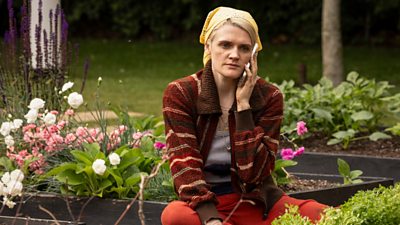
What drew you to this project?
I had worked with Janicza Bravo, our incredible director, a couple of years ago back in the States, and when the opportunity arose to work with her again I dropped everything because she’s so brilliant. I then read Jordan Tannahill’s book and found out about the history of the piece, because the story has had many different lives, and I was so inspired by that.
What were your initial thoughts when you read the scripts?
I was struck by how well it lends itself to the television structure and how beautifully it plays out. As much as I loved being inside of Claire’s mind, I was so eager to get into the new answers of who these people are. Because there are so many worlds within this world, and the scripts really explore that in a beautiful way whilst also protecting Claire’s voice.
What can you tell us about Jo?
Jo is someone who Claire encounters after she starts to hear The Hum and is introduced to a group of people who are also experiencing this hum. Jo is the partner of Omar who is the ‘leader’ of the group. Jo is presented as a stereotypical yogi - a wellness swan, hurtling very fast under the water and gliding across the top. She’s quite a mysterious woman, and you do have a lot of questions about her when you first meet her - the circumstances of her life, how she ended up here, where she’s come from, and how her relationship with Claire is going to play out.
What is the group that Omar and Jo run?
Omar and Jo have been running a group from their home for about five years. It’s inclusive of people from all walks of life and it’s for people who are experiencing The Hum. They give them tools to deal with it, to hopefully expand on it and find a way to ‘live inside’ of it.
What are the key themes within the series?
Female psychology is a huge one. It also delves in to what free thinking is, community, what a cult means, and where we are at as a society.
What did you initially think The Hum was, and did you think it was real?
I do think it’s real. It’s about what people do with it. I believe that it could exist for some people. What it is, what it means and what people do with it and how they live their lives is fascinating to me.
How do you think you would react if you could hear The Hum?
I could imagine myself as being any one of these characters. I could imagine being quite scared. I think we’re so concerned as a society about our health, our bodies, the internet, politics – so it’s all inside of this story.
If you had to hear a constant noise that only you could hear, what would it be?
I love rain, so if it could be raining all the time without actually raining. I love that sound, it’s calming. I’m from Scotland originally and it’s always raining, I find that sound comforting and meaningful to me.
What has it been like to film in the Northwest of England?
It feels like home. Manchester’s a major city to be adjacent to, it feels a lot more like where I’m from, which is Glasgow. To be shooting something in an ambiguous world but to be grounded in a very real place is a cool experience.
What do you think the viewers are going to get from watching the show?
I hope people will be challenged by it. I have many questions about it and I’m inside of it, working on it, and it can be quite unsettling. I hope viewers allow themselves to be a bit unsettled by it. I want people to open themselves to it.
Amr Waked (Omar)
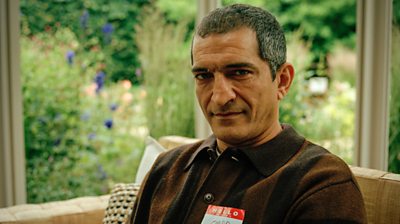
Tell us about your character, Omar?
Omar was a university professor where he taught geoscience – focusing on climate and weather. He's not a classical type of a person, he's the alternative guy. Some people will call him a pseudoscientist, maybe with prejudices against his ideas. I find him to be a lovely man who also refuses the world as it is.
What drew you to this project?
I was very magnetised by the script; I thought it was an original idea. It’s something that responds to a lot of things that I'm interested in, these ideas that are in the shadow of things that are not extremely commercial or public. I've read the books of many authors that respond to these ideas, and I think a lot of them have many great thoughts.
What is the group that Omar and Jo run?
They're a group that discovered The Hum a long time ago and it offers a different perspective, as opposed to suffering from it. They want to try and discover how this can take you to a higher place spiritually - it’s a place where you feel much more than ecstasy, much more than enjoyment. It sounds very spiritual, like salvation in a way. And that's what the group is. They’re trying to experience it and there is a sense of addiction to it, it's like a drug.
What do you think viewers will get from watching the show?
What I hope people will take away from the series is, first, to open their minds, and then to stop judging others as maybe it's time we look at things differently. This is something that I believe we suffer a lot from as a society, especially recently with all the different media outlets, population density, and the rapid style of our lives. We have nothing better to do than to judge someone based on just one shot inside their lives and think we know everything about it. I think it's time we stop doing that.
Samuel Edward Cook (Damian)
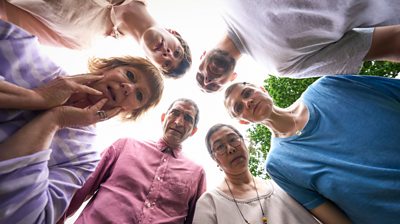
What drew you to this project?
My character Damian is a complex guy. He's an ex-serviceman and a dad. There's a lot of layers with Damian that drew me to the role. He's carrying a lot of past traumas from his experiences in the military, but also now he's living with The Hum and he's trying to understand what it is.
The character’s vulnerabilities, flaws, what you like about him, and what you don't like about him were all things I wanted to explore. Then that opened me up to the rest of the story. Jordan Tannahill's book, which the series is based on, is an interesting, quite unusual story of these people who are seeking answers to this strange phenomenon that I'd certainly never come across before.
What were your initial thoughts when you read the scripts? Had you read the book?
I was gripped by it, it's a real page turner because the characters are really seeking answers. As an audience member you're on that journey with them, trying to find out what this thing is. Is it an industrial thing, is it an environmental issue that’s causing this hum, or a spiritual or perhaps metaphysical thing? I was really gripped even before working on the job, just reading the script as an audience member, you really are invested in finding out what this thing is and seeing how it affects everybody in different ways.
What can you tell us about Damian?
He's been hearing The Hum for just over a year and he's been attending the group for a few months, so he's quite early on in terms of seeking help. It's obvious that, because he's been left to his own devices and searching for what this is and how it started, he's done a lot of his own work and entrenched himself in the deep, dark web. He's very much a part of websites such as Reddit and 4Chan where there's all these conspiracy theories flying around.
Damian is very much of the opinion that this is much bigger than an environmental or industrial issue and that this is government-level conspiracy, a worldwide pandemic. However, when he meets Jo and Omar and the other guys in the group, he starts to become a little bit more open-minded about what this might be. There's a lot of anger, angst, and frustration with Damian when you first meet him, and I hope over the series we see him soften slightly.
What is Damian’s relationship like with The Hum group?
Jo and Omar, at first, seem very genuine and authentic, however, as the story moves along, you feel like something's not quite right, and they're perhaps trying to manufacture theories behind what The Hum is to brainwash and gas light. You start to think, is this a cult? But the other side of me thinks, there’s clearly a reason why all these people are hearing this hum collectively, they've all individually found their way to this group for a reason.
Is Damian searching for like-minded conspiracists in the group?
From research and talking to people that invest a lot of time in conspiracy theories, I think people seek some sort of belonging, to find their tribe, and that's what Damian and the other listeners are trying to find. Along with living with The Hum, they're trying to find where they fit in the world. Conspiracy theories tend to be based on fear. As a human, if I don't understand something, if I'm in fear of something, I'm going to try to perhaps fill in the blanks with my own theories.
Finding a group of people who share similar views then empower those feelings and those conspiracies. Naturally you are going to gravitate towards that group of people. That's where we find Damian, he's at least found a group of people that will listen to him. They don't necessarily all agree with him, but they listen. He has a space that feels safe and where he feels empowered to be able to share these views.
What are the key themes in The Listeners?
A sense of community and belonging is a big theme within the show. All the characters,individually and collectively, are seeking something. They're all at different points of their lives because it's such a mix. The core listening group are all different ages, have different backgrounds and are at different stages in their lives, but they're all seeking something, and I think The Hum has brought them together.Coinciding with that is their quest for some sort of change in their lives, and they find a community, a sort of firm home. That's a strong thread throughout the story.
Meet the Creatives
Ed Guiney (Executive Producer for Element Pictures)
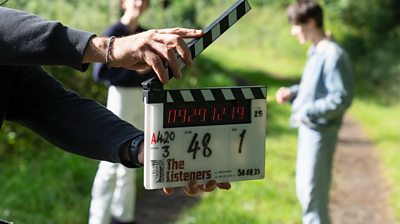
Can you give us a brief overview of The Listeners?
The Listeners tells the story of Claire, a mum and a teacher. Claire has an ostensibly happy and fulfilled life, but one day she begins to hear this hum and she can't find the source of it, so it slowly begins to drive her mad. No one really believes her, until one day, she breaks down in school and says that she can hear this noise and questions whether anyone else can hear it, everyone around her is perplexed. Then subsequently, one of her students, Kyle, comes to her and states that he can hear The Hum as well. The two of them then begin this quest to figure it out.
Why did you want to adapt this story for television?
It's fascinating because it's about an ordinary person living a normal life and something seemingly small and quite insidious begins to happen to her and grows disproportionately and looms very largely in her life and the lives of those around her. It is sort of metaphorical and there are lots of interesting themes that play out around belief, faith, what's going on in the world and what the kind of context for our lives is. We've always referred to it as genre-adjacent in that it takes some cues from horror and even sci-fi to explore big questions of our lives and humanity, but in a grounded way that we think a lot of audiences will be able to see themselves in
Why is now the right time for adapting The Listeners?
We live in a world that's very unstable and where a lot of our belief systems have been shattered. It's hard to feel tethered to a truth - The Listeners very much deals with those themes. It's about a woman who is experiencing something very intense, and initially the people around her just don't believe her. There's a commonality of experience in that for many people.
Tell us about the calibre of talent on this series and what they bring.
Jordan Tannahill is a Canadian playwright, novelist and screenwriter. The book is incredible, and he did an amazing job adapting it. It's a contained series and we always felt like we wanted to bring a signature filmmaker to direct. We all loved Janicza Bravo's film, Zola, and thought it was incredible. In some ways, it’s dealing with the nature of truth and certainty in the contemporary world. Thematically, there are strong links to The Listeners, and so we were delighted when she signed up to direct the series, as well as being an Executive Producer on it. That's been a real joy.
Tell us about the casting process and what you were looking for.
We love Rebecca Hall as our Claire. She's known for American film work, but we wanted to try and persuade her to come and play this very British part. She was very keen on the book, and also on working with Janicza, so we were delighted when she said yes.
Rebecca's performance is fantastic. She plays, in some ways, quite an ordinary person but who's experiencing something quite extraordinary. She does it in a way that is very inviting and generous, and she really allows audiences to empathise with what her character is going through.
Getting that role right was key and everything else kind of plays off that. One of the big relationships in the series is between Claire and Kyle. We cast the young Irish actor Ollie West to play that role, who is fantastic. He was just eighteen when we shot the series and he's fab. From there, we built out a brilliant cast around them.
We shot the series around Manchester, but it’s not set anywhere specific, it is English suburbia, so with Claire’s family, neighbours and other people in the group, it was about finding people who could populate that world credibly.
What are some of the key themes in the series?
Janicza was very keen to lean into the genre elements of the show. It has a kind of science-fiction element going on and that was something she was very keen to capture. We also shot it on film, which is quite unusual for a television series, but it was to try and give it a filmic texture and to create a world that’s both familiar but feels off-kilter.
Janicza Bravo (Director & Executive Producer)
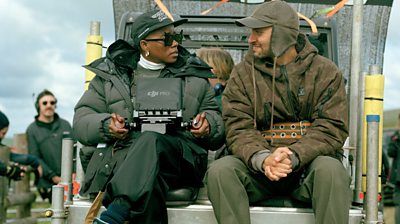
Can you give us a brief overview of The Listeners?
The Listeners is the story of a woman Claire, who starts to hear a sound that seemingly no one else can hear. The sound goes on to isolate and unravel her. Claire then finds a person who can also hear the sound who happens to be one of her students. This then leads to a not so good relationship between them. On the outside, it seems nefarious, but on the inside it's quite sweet and tender.
How did you collaborate with Jordan Tannahill on this project?
Jordan had sent me a note alongside the pilot and the series outline. We met soon after and started cobbling together this idea of what the series could look like. There's a feeling that happens where you read and fall in love with a novel, and then you see the adaptation and get really stuck on why something from the novel didn’t make it in – so, I'm a real purist in the way that I want everything that can be in the adaptation to be in there. Obviously not everything can be because that's what separates the book from the series, but I found myself being a real advocate for what I'd fallen in love with and really pushing for that to materialise inside of the series.
What are the key themes in The Listeners and what made you fall in love with the story?
One of the things that I fell in love with is Claire. On first review, it's a story about a woman who goes mad or is unfulfilled, and on the surface, it could be reduced to a mid-life crisis. Two references and films that had really spoken to me in the past came to mind when I was first brought on to The Listeners: ‘A Woman Under the Influence’ by John Cassavetes and ‘Safe’ by Todd Haynes.
Again, on the surface, these two films are about unwell women who seem to be communicating in a language that no one in their world could communicate back to them in. I found myself turned on by that, and I think it's maybe because I'm also a woman in my forties, and because I saw myself in her. I saw myself in the position of facing the questions, what if one day I woke up, I started to hear the sound and no one else in my world could? Would I ultimately be isolated? When you alienate and isolate people, they're pushed to make choices that are not always the best. They make the best choices for themselves but maybe not the best choices for their community.
Tell us about the kind of world you’ve set out to create visually?
I hope to make something that feels a little familiar, but also mostly alien. I think that The Listeners takes place on a planet that is adjacent to Earth. It looks like Earth. It smells like Earth. It moves like Earth. But rhythmically, it’s perhaps on a slight delay. Together as a team, we hope to have made this piece that is a little uncomfortable, mostly strange, alluring, and sexy.
Are there any specific references that you drew from for this project?
Every artist that brought themselves to this, behind and in front of the camera, was pulling from a similar aesthetic pool. One of our top references was the photographer Gregory Crewdson - his images of suburbia are awesome. His version is much more stylised than what we went for. They're lit intensely, but there is a kind of sterility to his suburbia, and we pulled from that a good deal.
Can you tell us about the casting process?
We approached it almost like a pyramid or a family tree. Casting Claire was our top priority, and it was then allowing whoever that was going to be to really influence the culture that we were building. We built the world around Rebecca once we got her. The next person to be cast was Kyle who is the student that she has the relationship with. It's not a traditionally romantic relationship, it's more of a friendship, but it is amorous. Something that I was into was a kind of twinness that they might have, like if we were to see them from a distance, would we be able to tell who was who? I like the idea of her subtly being attracted to a past version of herself. But I don't mean literally being attracted to someone that looks like her. Kyle felt like a younger version of herself that perhaps she longed for.
What did the cast members bring to their roles?
There is Prasanna who plays her husband Paul, and there is Mia who plays their daughter, Ashley. They do a phenomenal job of grounding and rounding out the family. Also Gayle Rankin and Amr Waked, who are the couple at the centre of the cult - I don't see it as a cult, but I'm using that word because I think that's the most simplistic and obvious way to boil them down. I do think they're a little bit more than that, and they end up being a kind of alternative family. If one is pushed, isolated, and abandoned by their core family, you leave them with no choice but to find new family and community. Both Gayle and Amr do a beautiful job of creating something enigmatic, dangerous, and kind of sexy too.
Can you tell us about the journey Claire goes on across the series?
Claire seemingly has everything going for her and lives this rather quaint and almost perfect life. She's got a great house, a good job, a loving partner and a precocious but very solid daughter with whom she has a great relationship with. Everything seems to be going well and then this annoyance and interruption is introduced that could potentially be something medical, but it then turns out it doesn't even seem to have a name or a diagnosis.
She does her best to keep it at bay while still being this great mother, wife, friend, and a pillar of her community. Then, one of her students also tells her that he has met this annoyance, this sound, and what they eventually call it, The Hum. She makes a not so good decision and hangs out with the student outside of school. Something that I hope is ultimately relatable is that to be heard, validated and to be understood is something that we all crave, whether or not we're able to voice that.
Claire goes on this wild journey where she loses herself, but she has to lose herself to find herself. Where she ends up is that she's not sure if she is totally fulfilled and comfortable with where her life ended up. It's possible to find yourself in a seemingly sane and healthy place and still not totally feel satisfied there. The question Claire’s asking is, am I allowed to not be fulfilled even though I've checked off all these markers?
Jordan Tannahill (Author & Writer)
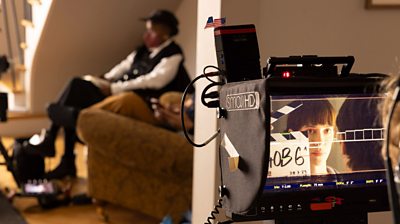
What do you think are the themes in the book that resonated the most with the readers?
In The Listeners there are many scientific theories as to what The Hum could be, and many of them are quite poetic in nature. There's a team of French scientists, who believe that The Hum could be caused by ocean waves, the concussion against the continental shelf, and creating vibrations that we then hear miles away. There are some people who believe it is a geoscientific phenomenon, which intrigues me. There's the idea that there’re aspects of the world of nature that we don't yet understand. There’re also theories that suggest that we could be living in conflict with nature. So, for instance, the sound could be the electric grid, or electromagnetic waves caused by 5G and so forth, and that also intrigues me. The idea that our built environment is afflicting us.
But going deeper than that, what intrigues me about the story is, do we have a shared reality in society? We have seen in our political arena the repercussions of large sections of the population living in two or multiple different realities. Claire finds herself living in a different reality, accepting a different set of facts and truths than her family and her colleagues. The story really gets at the nature of belief and even conspiracy culture. The idea of why is it that some people are drawn to potentially quite extreme forms of belief? The novel itself really interrogates the intersection between belief, conspiracy culture, mania and how these kinds of things rub up against each other and really are playing upon our lives now.
How difficult was it translating The Listeners to television?
One of the central questions around the adaptation was how do we depict The Hum? Do we just simply hear The Hum? Is that even possible? Can an audience hear it? That is interesting. How do we depict Claire’s experience in The Hum visually, how do we depict its wonder and transcendence, rapture and ecstasy on screen in ways that might be unexpected and ways that might seem akin to spiritual or even sexual experience, but somehow uniquely its own thing.
Janicza was instrumental in helping me think more visually about the work as when you live with the story for so many years in your head, it's easy to get locked into how the story goes, who the characters are.
What is the human draw to searching for the transcendent?
I'm interested in the human impulse towards the transcendent, the desire to leave ourselves - leave our corporeal containers, move beyond the body, join ourselves to something greater than ourselves. Sometimes that's not always a light, it could be a darkness as well. Sometimes we are drawn to a wildness, a chaos, which can potentially totally obliterate us or our lives. Claire is seeking and really drawing her hand as close to the flame as she can. I'm drawn to narratives and characters who are actively seeking something that they may not understand or grasp, but they apprehend viscerally, almost spiritually, and they're seeking a truth, an experience beyond them that has the chance to totally transform them.
What do you want viewers to get from watching the show?
I would love for them to see it as something of a fable that reflects our time, or at least kind of refracts some of the questions and concerns of the moment. I would love an audience to watch this and see themselves in Claire, first and foremost to see her journey as one that is seeing a woman who is really searching for answers - she's on a journey towards belief and uncovering what lies at the dark heart of this mystery. There’s this libidinal energy that I think courses through the work - she has this very strange relationship with Kyle, one that is maternal at times, it's never romantic, but there is this powerful kind of love and draw that really comes from two people who can really hear each other, listen to each other in ways that they can't find anywhere else. The curiosity of that relationship and how that unfolds, and how this family holds together, despite the extraordinary challenges that it is enduring, are all things, I hope, an audience is invested in and sees themselves.
On a very human level, I hope the drama intrigues them and the mystery draws them in. I’d love for them to have a space in which they can wrestle with some of these larger questions around belief, around the drive towards transcendence, the seeking of community. Is this a conspiracy culture? Is this a cult?
